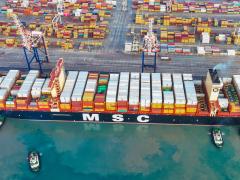'Make sure that your carrier complies!'
THE JULY deadline for compliance by cargo and passenger vessels with the International Safety Management (ISM) code has come and gone, and it's now up to shippers and forwarding agents to ensure that the vessels on which their cargo is moving have achieved the regulatory standard.
Ships that do not carry ISM certification will be banned from ports in Europe, North America, the Far East and many other ports in the world, and may have their insurance cover withdrawn.
The purpose of the new regulation is to limit risk, says national certification manager of SGS South Africa, David Anderson, who describes it as an ISO 9000 system in the environment of ships with the ship's captain seen as the leader of the quality of that ship.
The code provides an international standard for the safe management and operation of the vessels, and for pollution prevention. Its unstated purpose is to reduce human error, both ashore and on board, by the application of quality assurance and safety management principles.
Ships' head offices are audited twice a year, and the ships themselves once a year.
SGS is just one of the auditing bodies, but Anderson believes that they are well placed to provide the service, with 140 offices all over the world. Because of the multinationality of shipping companies, you have to be fairly multinational yourself.
While July this year was the deadline for tankers, bulk carriers, gas carriers, passenger ships and high-speed cargo craft, all other sea-going vessels will have to comply with the code by July 1, 2002.
It's imperative that clearing and forwarding agents are aware of the new regulations because ultimately it will affect their service to their clients, says Anderson.
In South Africa the South African Maritime Safety Authority (SAMSA) will enforce the code.
According to a report in the journal Safety Management, a levy will be raised against all ships calling at South African ports and SAMSA will charge market-related costs for statutory and classification surveys.
SAMSA is in the throes of recruiting surveyors from the private sector to achieve its goal of inspecting 10% of all vessels that call at SA ports.












